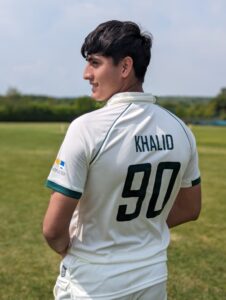In Conversation with Beacon Award finalist, New College Durham: “Sport provides an outlet and an opportunity to do something completely different”
In this blog, Stephen Ireland and Bridget Da Silva from New College Durham reflect on their nomination for the Beacon Excellence in ESOL award, how sport has boosted learners’ confidence as they adapt to both general and academic life in the UK.
New College Durham was named a finalist for AoC The Bell Foundation Excellence in ESOL Award in 2024. This recognises the college's focus on providing sport opportunities to increase confidence, engagement, and mental health amongst asylum seeking students to support their English skills and social integration into the local community.
Stephen Ireland, Head of School and Bridget Da Silva, ESOL Curriculum Manager met to reflect on the nomination and how their innovative approach to ESOL boosts learners’ confidence as they adapt to both general and academic life in the UK.
Bridget: Hello Stephen. What would you say is our main priority as a provider of ESOL?
Stephen: As someone who came here with limited experience with ESOL, I’ve come to understand since joining that it's all about creating opportunities for all our students to reach their potential. All ESOL students have vastly different starting points and so it’s about creating those moments, whatever their background. It’s about giving them the tools to become part of the local community and developing their soft skills, such as confidence and communication, to help them feel like they belong.
Bridget: I think you're right. You can have the best teaching programme and resources in the world, but if the students don't feel comfortable, they're not going to be able to make that next step. So, can you explain a little more about how our sports programme come about?
Stephen: Before coming to New College Durham I was a sports lecturer, and I now look after both the sports and ESOL courses. I’m obviously a bit biased, but I love sport. We noticed an opportunity when a lot of our ESOL learners were keen to get involved in enrichment activities.
 Bridget: I think we’ve also been very lucky with our staff to make it all happen. We have a very passionate Enrichment Officer who just wants people to be involved; he’s been instrumental in our sports programme and makes an effort to meet and engage every student.
Bridget: I think we’ve also been very lucky with our staff to make it all happen. We have a very passionate Enrichment Officer who just wants people to be involved; he’s been instrumental in our sports programme and makes an effort to meet and engage every student.
A few years ago, we had a fantastic football player who was the first ESOL student to play on the college football team. His high standard of playing meant that the college became a lot more receptive to considering ESOL players. From there the programme has really snowballed, with ESOL students now able to get involved with other sports including rugby and cricket.
Stephen: Yes, tapping into sport has been one of the main ways we’ve adapted our ESOL offering to meet the needs of our students. Bearing in mind what some of our ESOL learners have been through, sport has allowed them some escapism and a chance to just enjoy the present moment.
Bridget: I would agree that sport has been invaluable in helping us to address one of the biggest challenges that many of our learners face, which is trauma. We've seen a massive increase in the levels of trauma over the last two years, especially in the unaccompanied asylum seekers who come to study with us.
Trauma can mean that those affected may have difficulty memorising things or focusing in lessons. It also impacts on staff and so we've invested in as much training as we can. We do refer students to counselling, but the sports programme has certainly helped these young people. It's given them an outlet and an opportunity to do something completely different.
I would boil it down to two words: compassion and enjoyment. If you can get students to enjoy what they're doing and feel comfortable around the staff, team, and the field, they will flourish, so it’s important to create the right environment.
Bridget: So Stephen, why do you think our ESOL programme has been recognised with this nomination?
Stephen: I would boil it down to two words: compassion and enjoyment. If you can get students to enjoy what they're doing and feel comfortable around the staff, team, and the field, they will flourish, so it’s important to create the right environment.
Bridget: Yes, and another recommendation to others running ESOL departments would be to just persist. Get in touch with everybody and anybody in your setting to see who will engage with you to explore what might be possible for your learners. Almost every college will have a sports department that could be leveraged, for example.
Stephen: What are the main outcomes in our students that you’ve seen thanks to the sports programme?
Bridget: We’ve seen a massive improvement in our students’ confidence and communication skills because they have to communicate with their teammates and coaches in English. We’ve also seen a 100% retention and 100% achievement rate in ESOL classes as a result. Playing sport gives learners a release of energy which means that when they return to the classroom, they come with a positive mindset and are ready to learn. It's made a huge difference.
One of our former ESOL students, Khalid K, was a really talented cricket player from Afghanistan. He first started playing here at Durham Cricket Club, which gave him the confidence to join his local cricket club. He's now tipped to be spotted for England, but most importantly, he also has the confidence to volunteer at local schools as a cricket coach. A lot of our learners now play for various sports teams. This also benefits our students from the local area, since it develops their cultural capacity to get to know students who they wouldn’t have otherwise met.
Playing sport gives learners a release of energy which means that when they return to the classroom, they come with a positive mindset and are ready to learn. It's made a huge difference.
Bridget: So, what's next on the agenda for our ESOL programme?
Stephen: We would like to continue growing the sports programme. There is a lot of potential with our current cricket offering and Newcastle Rugby Foundation will hopefully be delivering weekly sessions from next year. Then we need to think about an alternative option to sport.
Bridget: Yes, we know that for our female students, some may like to watch sport but don't necessarily want to play, which is understandable. So we want to provide something that's going to give them the same benefits associated with sport, including that sense of release and freedom. We know from student surveys that our learners like drawing, so we’re looking into that as a potential holistic option alongside gardening, which would go hand in hand with cooking.
Stephen: Definitely. Do you have any final reflections on our award nomination?
Bridget: I’m super proud. We've got a fantastic ESOL team and a very supportive manager, but I am most proud of our students. I think they are amazing to have been through so much and to then come to college every day with smiles on their faces and positive mindsets.
One of my favourite moments was when the Beacon judges came to meet some of our ESOL learners. One student who arrived at college with pre-existing communication needs but has since learned to speak in English, told the judges: “This has changed my life.”
